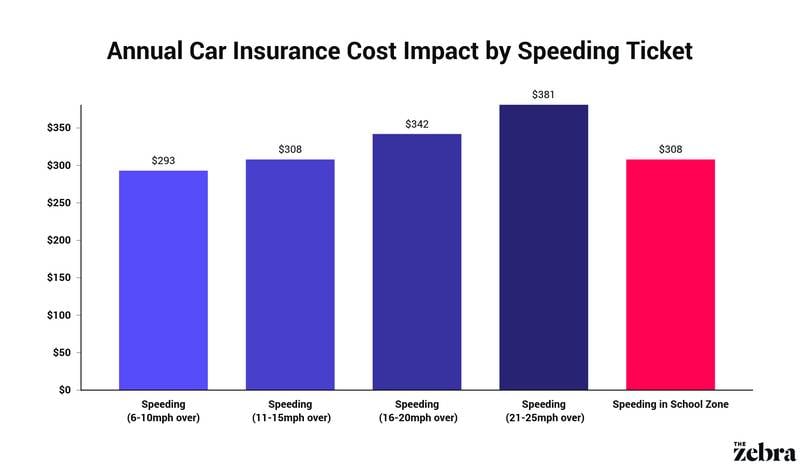How Long Do Texas Traffic Tickets Stay on Your Record?
Blue and red lights flashing behind your car are never a good indication. A traffic citation in Texas remains on your driving record for three years following the conviction. Along with the violation record, the points linked with the ticket are also kept for three years. Most drivers will pay up to $200 in fines and court costs for a traffic ticket, but that is likely not the end of additional taxes or surcharges. Certain offenses result in larger fines.
Misdemeanor Citations
If you have been issued a citation for a misdemeanor traffic offense such as driving with a suspended license (DWLS), hit and run or reckless driving, it is important to understand the consequences of your potential conviction. Depending on the severity of the charge, you may face steep fines, probation, jail time, a suspended license, or even an SR-22 insurance requirement. To ensure you are equipped with all the information you need to make an informed decision in court, don’t hesitate to seek legal counsel before your court date. Doing so will give you the best chance of minimizing the impact these charges might have on your future.
Felony Citations
If you’ve been charged with a felony traffic offense, it’s essential to seek legal counsel immediately. Consequences of these charges can range from a one-year license revocation to serving time in jail or prison. Common felony traffic offenses include hit-and-run injury, vehicular assault, and vehicular homicide. Each charge carries its own potential punishments and should be taken seriously as soon as you are informed of the charges. To ensure that your rights are properly defended, consult a qualified attorney who can provide legal insight and advice throughout the process.
How traffic tickets impact your driving record
When you receive a traffic ticket, whether it’s for speeding, running a red light, or any other traffic violation, it is recorded on your driving record. This record is maintained by the Texas Department of Public Safety (DPS) and can be accessed by law enforcement officers, insurance companies, and potential employers.
Speeding tickets
The duration that a traffic ticket stays on your record depends on the severity of the offense. For minor violations, such as a speeding ticket, the ticket can remain on your record for three years from the date of conviction. This means that during this period, the ticket will be visible to anyone who checks your driving record.
DUI or reckless driving
However, more serious offenses can have a longer-lasting impact. For example, if you receive a ticket for driving under the influence (DUI) or reckless driving, it can stay on your record for up to ten years. These types of offenses are considered major violations and are viewed very seriously by authorities.
Higher insurance rates
Expect to pay more for auto insurance coverage if you have traffic fines on your record. Many moving offenses in Texas will cause insurance rates to climb by 15% or more.

Having traffic tickets on your record can result in various consequences. Firstly, your car insurance rates may increase significantly. Insurance companies consider drivers with a history of traffic violations to be at higher risk, and as a result, they charge higher premiums. Additionally, accumulating multiple tickets can lead to the suspension or revocation of your driver’s license.
Surcharge Assessment (Repealed)
The Texas Department of Public Safety (DPS) charged drivers surcharges depending on traffic violations. This surcharge was based on either a conviction or points. Moving infractions, such as speeding, were punishable by two points per conviction. If the offenses resulted in a collision, however, three points were deducted.
Drivers with six or more points on their record faced an annual fee. If the driver did not earn any additional points within a year, one point was deducted from the total.
If a driver is convicted of any of the following charges, there are no points assessed, per se:
- Driving under the influence
- Driving without a license
- Driving with an invalid license
- Driving without insurance
Instead, the individual must pay an annual surcharge for three years beginning with the date of conviction. If you choose, you can pay the three-year extra all at once.
You may have many questions if you have received a traffic ticket warrant in Texas. What effect will it have on your record? How much money will you have to pay? Will it have an impact on your job applications or insurance rates? The answers to these questions will be determined by how you reply to the warrant.
Defense lawyers understand the consequences of a Texas traffic ticket warrant, both now and in the future. They are here to offer you the counsel and vigorous representation you require to safeguard your rights.
Traffic Ticket Plea Agreements
A driver in traffic court may enter a guilty, not guilty, or no contest plea. Pleading guilty or no contest will almost certainly result in the payment of fines and points for the ticket. The infraction is recorded on your driving record.
The driver must appear in front of the traffic court judge if he or she pleads not guilty. The driver must give evidence that they did not commit the alleged motor vehicle infraction. It is better to enter a not-guilty plea after consulting with a traffic ticket attorney.
Remember that failing to respond to a traffic infraction and failing to appear in court results in the court issuing a traffic ticket warrant. That is something you should always avoid since it implies that a law enforcement officer may arrest you at any time. Warrants may surface on background checks, affecting your ability to obtain jobs, housing, or financing. If a traffic warrant is issued, you should seek legal counsel as soon as possible.
Clearing Your Record through Defensive Driving Courses
By enrolling in an approved defensive driving course, you can typically dismiss one traffic ticket every 12 months. This option is available for most minor traffic offenses, such as speeding, running a red light, or failing to yield. However, it’s important to note that some serious violations, such as driving under the influence or leaving the scene of an accident, may not be eligible for dismissal through defensive driving.
Completing a defensive driving course not only helps you maintain a clean driving record but also offers additional benefits. These courses provide valuable knowledge on safe driving techniques, traffic laws, and defensive driving strategies. By enhancing your driving skills, you can reduce the risk of future violations and keep yourself and others safe on the road.
To clear a traffic ticket from your record through defensive driving, there are a few steps to follow:
- Ensure that you meet the eligibility requirements set by the Texas Department of Licensing and Regulation. These requirements typically include holding a valid driver’s license, having insurance coverage, and pleading guilty or no contest to the traffic violation.
- Once you meet the requirements, you can enroll in an approved defensive driving course. These courses are available both online and in-person, providing flexibility to accommodate your schedule. During the course, you’ll cover various topics related to safe driving and traffic laws, and upon successful completion, you’ll receive a certificate of completion.
- After obtaining your certificate, you must submit it to the court handling your traffic violation. It’s crucial to meet the deadline specified by the court to ensure the ticket is dismissed and doesn’t result in any penalties or points on your driving record.
Factors that can affect the duration of a traffic ticket on your record
Several factors can influence the duration of a traffic ticket on your record in Texas. While many people assume that traffic tickets automatically disappear after a certain period, the reality is more nuanced. Understanding these factors can help demystify the complexities of ticket durations and the potential impact on your driving record.
Offense Severity
The severity of the offense plays a crucial role in determining how long a traffic ticket stays on your record. In Texas, minor violations such as speeding tickets or failure to signal may remain on your record for three years from the date of conviction or guilty plea. However, more serious offenses like DUI/DWI or reckless driving can have longer-lasting consequences, with potential implications for up to ten years.
Repeat Offenses
If you accumulate multiple traffic violations within a specific timeframe, the duration of those tickets on your record may be extended. Each subsequent offense can compound the impact, potentially leading to longer periods of time before the tickets are removed from your record.
Defensive Driving Courses
In some cases, completing a defensive driving course can provide an opportunity to have a traffic ticket dismissed or prevent it from appearing on your record. Taking an approved course within a specific timeframe and meeting the necessary requirements can help mitigate the impact of a ticket and potentially reduce its duration on your driving record.
License Points System
Texas employs a driver’s license points system, whereby points are assigned for different types of traffic violations. Accumulating too many points within a designated period can result in license suspension or revocation. The duration of the points on your record may align with the severity of the offense and can impact your driving privileges.
Expungement Options
In certain situations, you may be eligible to have a traffic ticket expunged from your record. This typically applies to cases where the ticket was wrongfully issued or based on mistaken identity. Expungement can remove the ticket from your record entirely, ensuring it does not impact your driving history.
Do traffic ticket warrants show up on background checks?
The long-term consequences of traffic ticket warrants in Texas can be significantly more severe than the fee you may be required to pay at the time of resolution. They might appear when you apply for jobs, scholarships, license renewal, or auto insurance.
A traffic ticket warrant will surface on a background check depending on a few criteria. Your ticket could be issued by a town, county, or state, and whether or not the warrant is reported depends on the protocol of the issuing institution. The level of background checks performed can also influence reporting. For example, if you are applying for a job that requires driving on duty, the check is more likely to include DMV records, where the warrant may be found. Your traffic ticket warrant attorney can assist you in determining whether you have outstanding warrants and whether they will appear in areas that may affect you.
Why a lawyer is beneficial for resolving an unpaid traffic ticket
Arrest warrants add stress to the situation since they create ambiguity. You could be out with your family, at work, or even coaching a t-ball game when an active warrant catches up with you and you are arrested.
As previously said, there are several options for resolving a warrant, but hiring an attorney to post bail and handle negotiations is the most advantageous. However, they are not the only advantages. When you employ a lawyer, you may navigate the legal system with confidence rather than fear.
Options to Remove a Traffic Ticket from Your Record
If you find yourself in a situation where you want to remove a traffic ticket from your record in Texas, there are certain steps you can take to increase your chances of success. It’s important to note that not all traffic tickets can be removed, so it’s crucial to understand the specific circumstances surrounding your ticket before proceeding with any removal attempts.
Attend defensive driving school
In Texas, attending a defensive driving school can be a viable option to have a traffic ticket dismissed or prevent it from appearing on your driving record. This option is typically available for minor traffic offenses and requires completing a state-approved course within a specified timeframe.
Consult with an attorney
If you believe you have strong grounds for contesting the ticket or want to explore legal avenues for its removal, it’s advisable to consult with a traffic ticket attorney. They can provide guidance on whether your case qualifies for ticket dismissal or reduction and represent your interests in court if necessary.
Request deferred adjudication
Another option to consider is requesting deferred adjudication, also known as deferred disposition. This involves entering into an agreement with the court to complete certain requirements, such as attending a driving safety course or maintaining a clean driving record for a specified period. Successful completion of the agreement can result in the dismissal of the ticket.
File an appeal
If you believe there were errors or irregularities in the ticketing process or subsequent court proceedings, you may have grounds to file an appeal. Engaging an attorney with expertise in traffic law can help you navigate the appeals process effectively.
Additional resources:
- Harris County Justice Courts: Information About Traffic Cases
- Texas Department of Public Safety: Your Texas Driving License
- Car Insurance: How much does insurance go up after a speeding ticket?
FAQs on Driving Record Texas
How can I see my Texas driving record?
You can view your Texas driving record online through the Department of Public Safety. You will need to provide your driver’s license number and a valid form of payment to access your record.
How do I get my driving record for free in Texas?
Unfortunately, there is no free way to obtain your Texas driving record. The Texas Department of Public Safety charges a fee for accessing driving records, which are considered confidential documents.
How much does a Texas driving record cost?
The cost of obtaining a Texas driving record is $11.90. This will cover the cost of the driving record itself as well as any applicable taxes or fees.
Are Texas driving records public?
Texas driving records are considered confidential documents under state law and are not accessible to the public.
How long does Texas keep driving records?
Texas drivers are required by law to maintain accurate and up-to-date driving records for at least five years. After that time has passed, the driving record is no longer available from the Department of Public Safety.
Does Texas have free public records?
Yes, a wide variety of public records in Texas are available at no cost, including birth certificates, death certificates, marriage licenses, and criminal records. However, driving records are considered confidential documents and cannot be accessed without paying the required fee.
Do all accidents show up on your driving record Texas?
All accidents reported to the Department of Public Safety will appear on your Texas driving record. In addition, any convictions or citations issued after an accident will also be reflected on the record.
Are public records available online in Texas?
Yes, many public records in Texas are available online through the appropriate government agency’s website. However, confidential documents such as driving records cannot be accessed online due to their sensitive nature.
Does Texas have open records?
Yes, subject to certain restrictions, many public records in Texas are open and accessible to the public. However, some documents such as populated court minutes remain confidential and may only be viewed upon request.
Can you clean your driving record in Texas?
No, it is not possible to “clean” or remove information from your Texas driving record. However, once the required period of time has passed (usually five years), the information is no longer considered valid and may be removed from the record on request.
Do cops know if you have insurance in Texas?
Yes, law enforcement officers have access to driver’s insurance information through the Department of Public Safety’s database. It is therefore important to maintain valid car insurance at all times when operating a vehicle in Texas.
Is Texas a no-fault accident state?
No, Texas is not a “no-fault” accident state. Drivers found responsible for causing an accident can face legal action and be held liable for damages.
Do insurance companies report accidents to DMV Texas?
Yes, insurance companies are required by law to report any accidents involving their customers to the Department of Public Safety. This information is then used to update the driver’s records accordingly.




